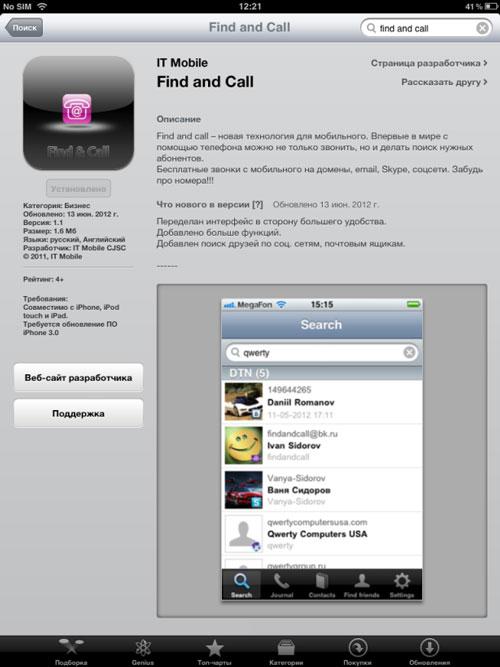Apple confirmed on Thursday to Jim Dalrymple of The Loop that it removed the malware, an application named "Find and Call," once it was alerted to its presence on the App Store. The company said the software was pulled for violating App Store guidelines by accessing a user's Address Book data without authorization.
The application was revealed by Kaspersky earlier on Thursday to be a Trojan that would upload a user's phone book to a remote server. From there, the server sends out text message spam to all the contacts in the user's address book with a link to download the application.
In addition to being found in Apple's iOS App Store, the "Find and Call" software was also found on the Google Play storefront for Android handsets. Google has presumably also responded by pulling the application, as it can no longer be downloaded from Google Play.
Malware is an extremely rare occurrence on Apple's iOS platform, as the company has a review process that analyzes each individual application made available for download on the App Store. The company first began publishing its guidelines for review in September of 2010.
However, malware has routinely been found on Google's more open Android platform. Last year one security firm claimed that Android malware had increased by 472 percent in just one four-month span.
The malware issue on Android has been attributed to the lack of a review process such as Apple's, as well as the ease for a developer to make an anonymous account and pay the low $25 fee required to begin posting software to Google Play.
This May, Apple quietly made public a report detailing the extensive efforts it has undertaken to secure its mobile operating system. The paper boasts that Apple "designed the iOS platform with security at its core."
 AppleInsider Staff
AppleInsider Staff


 William Gallagher
William Gallagher
 Thomas Sibilly
Thomas Sibilly
 Andrew O'Hara
Andrew O'Hara
 Amber Neely
Amber Neely
 Marko Zivkovic
Marko Zivkovic
 Malcolm Owen
Malcolm Owen
 William Gallagher and Mike Wuerthele
William Gallagher and Mike Wuerthele









36 Comments
Can't legal action be brought against these people since this stuff is illegal? And don't tell me spam/malware is legal in Russia; that doesn't make me feel any better. :lol:
Hopefully this will lead to an even more stringent App Store review process. I thought the review process was designed expressly to prevent these type of things, as well as buggy apps. I'm sure no system is perfect, but at least on the malware front it's been pretty good up until this.
[quote name="elliots11" url="/t/151112/apple-pulls-russian-malware-from-ios-app-store#post_2141082"]Hopefully this will lead to an even more stringent App Store review process. I thought the review process was designed expressly to prevent these type of things, as well as buggy apps. I'm sure no system is perfect, but at least on the malware front it's been pretty good up until this. [/quote] Or it just happened to be that mistake which slipped through. No matter how stringent the system, with an operation this big, there are always going to be mistakes. And with one slip-up of this kind I'm inclined to think along those lines. That said, it's even possible that this app functioned within review parameters and the developer chose to do something else after approval (depends on what Apple currently allows in relation to user contact data). If that's the case, it's possible the system needs to be tightened up. Changes to accessing contacts in iOS 6 might help a bit here.
[quote name="elliots11" url="/t/151112/apple-pulls-russian-malware-from-ios-app-store#post_2141082"]Hopefully this will lead to an even more stringent App Store review process. I thought the review process was designed expressly to prevent these type of things, as well as buggy apps. I'm sure no system is perfect, but at least on the malware front it's been pretty good up until this. [/quote] I'm curious to know how this one slipped through. I wonder if a reviewer was just asleep at the wheel.
[quote name="BigBillyGoatGruff" url="/t/151112/apple-pulls-russian-malware-from-ios-app-store#post_2141092"] I'm curious to know how this one slipped through. I wonder if a reviewer was just asleep at the wheel.[/quote] Well, it isn't as though uploading your contacts isn't allowed by Apple. Apple simply doesn't allow exploitation of your contact information for the purpose of spamming SMS messages. The claims made by the developer may have matched the apparent functionality of the app when tested. This is why the Privacy Settings in iOS 6 are so vital.